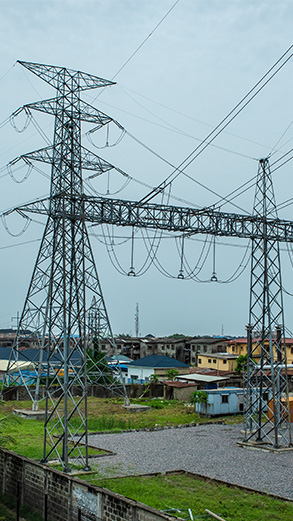Countries:
Nigeria
Status:
Completed
Sector:
Energy
Transforming the Nigerian power grid and improving energy access to underserved communities by leveraging mini-grids in conjunction with smart sensors.
The Nigerian power system (NPS) creates an unreliable supply for local communities. Persistent issues include little-to-no access to electricity, erratic and poor-quality electricity supplies, and frequent, lengthy electricity supply outages. The government and international donors have worked to develop renewables-based on- and off-grid mini-grids to tackle this. However, integrating renewable energy systems into the electrical networks has proved challenging, as network operators lack the knowledge and tools required to fully take advantage of grid-connected mini-grids. This has been attributed to financial and technical challenges in the Nigerian electricity supply industry (NESI).
This project aimed to address these challenges by developing technical reports and papers to help leverage the renewables/energy storage systems on mini-grids. This would provide the support and ancillary services necessary to reduce grid outage – improving grid/mini-grid availability and reliability. Smart communicating sensors were also used to monitor both grids/mini-grids to ensure optimal operation. In addition to these technical recommendations, the project built the capacity of Distribution Companies (DisCos) to manage the increasing penetration of distributed generation within their networks, while using smart sensors to improve NPS performance. Overall, this increased the electricity supply reliability and availability for unserved and underserved regions and communities in Nigeria.
This project was delivered by Nortech in partnership with Bayero University Kano (BUK). The team also worked closely with key stakeholders in the NESI such as Rural Electrification Agency (REA) and Nigerian Electricity Regulatory Commission (NERC).
"Improved and sufficient energy access will help youth carry out daily businesses like haircuts, laundry and dry-cleaning services among others. It will help my children do their homework, as most times I usually use my phone torchlight to assist them"
Usman A. Suleiman
Danbare resident

The team presented three technical reports to key stakeholders in a workshop at NIGERCON in 2022 – a flagship conference in the Nigeria energy sector
The research paper "Benefits of Smart Devices and Grid-tied mini-grids on the Nigerian Electricity Supply Industry" outlines how to reduce energy losses and supply outages
The technical report "Strategies to transform the Nigerian Power System into a smart grid" included recommendations to transform the NPS to a smarter grid
Recommendations were made to key stakeholders on the most effective locations to install smart communicating sensors on a network or mini-grid
The project successfully delivered three technical reports on how to improve electricity supply using smart sensors and grid-connected mini-grids. These were circulated among NESI stakeholders to build their technical knowledge. This capacity was enhanced through a workshop on how smart sensors and mini-grids can be used to transform the NPS and improve electricity access.
Key outcomes of these deliverables include:
Identified new ways to cost-effectively improve and sustain clean electricity access for women, children, poor households, and vulnerable groups
Identified new ways of monitoring GESI impact of electricity access e.g., using smart sensors to understand supply to poorer communities, allowing for improvements
A GESI report, shared with key NESI stakeholders, increased the overall awareness of the importance of equal electricity access
50% of participants in the targeted training on the use of smart sensors for controlling gird-connected mini-grids were female
The World Bank SE4ALL database indicates that 43.5% of Nigeria's population lack access to energy as of 2018. In this context, this project aimed to improve energy access for the unserved and/or underserved communities via the improvement and extension of grid supply availability to these communities.
The project identified a number of GESI-related improvements, circulated amongst NESI stakeholders, including:

The project developed some key recommendations and lessons learnt:
Benefits of Smart Devices and Grid-tied Mini-grids on the Nigerian Electricity Supply Industry
Visit websiteUK PACT (Partnering for Accelerated Climate Transitions) is a unique capacity-building programme. Jointly governed and funded by the UK Government’s Foreign, Commonwealth and Development Office (FCDO) and the Department for Energy Security and Net Zero (DESNZ) through the UK's International Climate Finance, it works in partnership with countries with high emissions reduction potential to support them to implement and increase their ambitions for tackling climate change.
© Copyright 2025 UK PACT Privacy Notice Cookie Policy